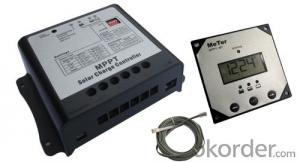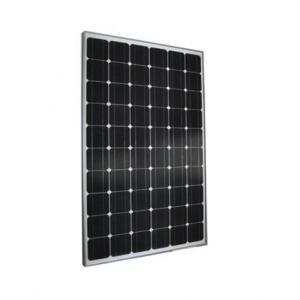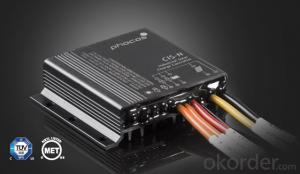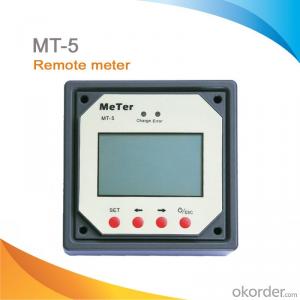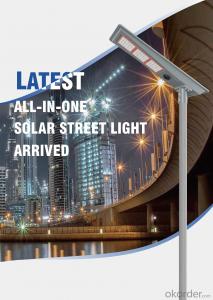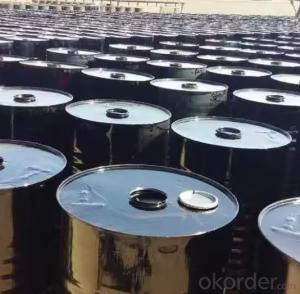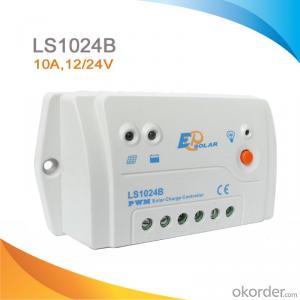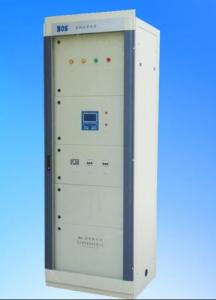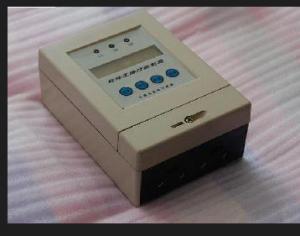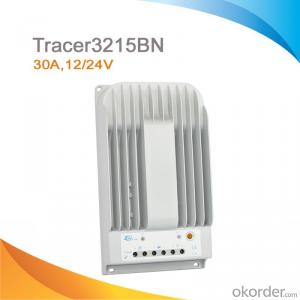MPPT Solar charge congtroller+4-stage charging+Remote meter(Options)
- Loading Port:
- Shekou
- Payment Terms:
- TT OR LC
- Min Order Qty:
- 100 unit
- Supply Capability:
- 100000 unit/month
OKorder Service Pledge
OKorder Financial Service
You Might Also Like
1 The solar charge controllers with MPPT (Maximum Power Point Tracking technology)
2.Than PWM charge controller can improve the charging efficiency of 30%
3.12V/24V system Automatic detection
4. four-stage charge mode
5. solar panels open-circuit voltage: 75V
6. External LCD display, real-time display of the various parameters of the controller, and the fault code
7. Full electronic protection, with low voltage protection, overcharge protection, automatically restore the connection, anti-reverse feature
8. PCB board with waterproofing
Technical data
MODEL | MPPT7510 | MPPT7515 | |
| System voltage | 12V/24V Automatic detection | ||
| Rated battery current | 10A | 15A | |
| PV max. input voltage | 75V | ||
| PV max. input power | 12V system:150W 24V system:300W | 12V system: 200W | |
| Self-consumption | <35ma< td=""> | ||
Meter connection | RJ45 (8-PIN) | ||
| Battert voltage range | 7V-36V | ||
| Temp. conpensation range | -5mV/ ℃/cell | ||
| Low-voltage disconnect | 11.5V /11V (option): 24V system:×2 | ||
| Regulation method | 4-stage charge mode | ||
| Low-voltage reconnect | 12.5V ; 24V system:×2 | ||
| Operating Temperature | -40℃--60℃ | ||
| Dimensions | 152 ×113×47mm | ||
| Weight | 0.6kg | ||
- Q:What is the maximum charging current that a solar controller can provide?
- The maximum charging current that a solar controller can provide depends on several factors including the specifications of the solar controller itself and the capacity of the battery being charged. Solar controllers typically have a maximum charging current rating, which is the maximum amount of current that it can safely provide to the battery. This rating can vary widely depending on the model and brand of the solar controller. Additionally, the maximum charging current that a solar controller can provide might also be limited by the capacity of the battery being charged. Some batteries have specific charging requirements and limitations, and exceeding these limitations can lead to damage or reduced battery lifespan. It is important to consult the specifications and guidelines of both the solar controller and the battery to determine the maximum charging current that can be safely utilized.
- Q:Can a solar controller be used with lithium-ion batteries?
- Yes, a solar controller can be used with lithium-ion batteries. Lithium-ion batteries are commonly used in solar energy systems, and a solar controller helps regulate the charging and discharging of the batteries, ensuring optimal performance and longevity.
- Q:What is the size and weight of a typical solar controller?
- Solar controllers can have different sizes and weights, depending on the model and manufacturer. Nonetheless, they are usually compact and lightweight. On average, their dimensions range from 5 to 7 inches in length, 3 to 4 inches in width, and 1 to 2 inches in height. Regarding weight, they typically weigh between 0.5 and 1 pound. These dimensions and weights make solar controllers effortless to install and integrate into solar power systems, as they occupy minimal space and do not add excessive weight.
- Q:What is the maximum input power that a solar controller can handle?
- The specific model and technical specifications of a solar controller determine its maximum input power capacity. Solar controllers are generally designed to accommodate various solar panel configurations and sizes by being capable of handling a wide range of input power levels. The maximum input power capacity of a solar controller is typically indicated by its maximum supported solar panel wattage. For instance, a solar controller may have a rating of 300 watts or 600 watts for its maximum input power. This means that it can effectively regulate and convert the energy generated by solar panels with a combined wattage of up to the specified power level. To ensure optimal performance and prevent any potential damage to the solar controller, it is crucial to select a controller that can handle the maximum input power of the solar panel system. Exceeding the maximum input power rating of a solar controller can result in overheating, reduced efficiency, or even failure of the controller. When choosing a solar controller, it is advisable to consider the total wattage of the solar panels in the system and select a controller that can comfortably handle that power level. Additionally, consulting the manufacturer's specifications and guidelines for proper selection and installation of the solar controller is recommended to ensure compatibility and safety.
- Q:What is the maximum power capacity that a solar controller can handle?
- The maximum power capacity that a solar controller can handle depends on the specific model and manufacturer. Solar controllers are designed to regulate the flow of power from solar panels to batteries or other loads. They are typically rated in terms of their maximum current handling capacity, which is measured in amps. The maximum power capacity of a solar controller can be calculated by multiplying the maximum current rating (in amps) by the system voltage (in volts). For example, if a solar controller has a maximum current rating of 30 amps and the system voltage is 12 volts, then the maximum power capacity would be 360 watts (30 amps x 12 volts = 360 watts). It is important to choose a solar controller that can handle the maximum power capacity of your solar system. Exceeding the maximum power capacity of a solar controller can lead to overheating, reduced efficiency, or even damage to the controller. Therefore, it is recommended to consult the manufacturer's specifications or seek professional advice to ensure that the solar controller can handle the power capacity of your specific solar system.
- Q:Can a solar controller be used with a solar water heating system?
- Yes, a solar controller can be used with a solar water heating system. A solar controller is designed to regulate and optimize the operation of solar panels, which generate electricity from sunlight. While a solar water heating system uses solar panels to heat water directly, the controller can still be used to monitor and control the temperature and flow of water, maximizing the efficiency of the system.
- Q:Can a solar controller be used for off-grid cabins or RVs?
- Yes, a solar controller can be used for off-grid cabins or RVs. A solar controller is an essential component of a solar power system, regulating the flow of electricity from the solar panels to the battery bank. It ensures that the batteries are charged efficiently and protects them from overcharging or damage. Whether it's an off-grid cabin or an RV, a solar controller helps optimize the use of solar energy and ensures a reliable and sustainable power supply.
- Q:Can a solar controller be used with a solar-powered water heater for swimming pools?
- Yes, a solar controller can be used with a solar-powered water heater for swimming pools. A solar controller helps regulate and control the flow of heated water from the solar panels to the pool, ensuring optimal energy efficiency and temperature control.
- Q:Can a solar controller be used with solar-powered indoor food preservation systems?
- Yes, a solar controller can be used with solar-powered indoor food preservation systems. A solar controller helps regulate and optimize the charging and discharging of solar batteries. It ensures that the solar panels collect enough energy to power the food preservation system, while also protecting the batteries from overcharging or discharging. Therefore, a solar controller is essential in maintaining the efficiency and reliability of a solar-powered indoor food preservation system.
- Q:How does a solar controller handle battery overvoltage protection?
- A solar controller handles battery overvoltage protection by monitoring the voltage levels of the battery. When the voltage exceeds a predetermined threshold, the controller automatically reduces or stops the charging current to prevent overcharging and potential damage to the battery.
1. Manufacturer Overview |
|
|---|---|
| Location | |
| Year Established | |
| Annual Output Value | |
| Main Markets | |
| Company Certifications | |
2. Manufacturer Certificates |
|
|---|---|
| a) Certification Name | |
| Range | |
| Reference | |
| Validity Period | |
3. Manufacturer Capability |
|
|---|---|
| a)Trade Capacity | |
| Nearest Port | |
| Export Percentage | |
| No.of Employees in Trade Department | |
| Language Spoken: | |
| b)Factory Information | |
| Factory Size: | |
| No. of Production Lines | |
| Contract Manufacturing | |
| Product Price Range | |
Send your message to us
MPPT Solar charge congtroller+4-stage charging+Remote meter(Options)
- Loading Port:
- Shekou
- Payment Terms:
- TT OR LC
- Min Order Qty:
- 100 unit
- Supply Capability:
- 100000 unit/month
OKorder Service Pledge
OKorder Financial Service
Similar products
New products
Hot products
Hot Searches
Related keywords
